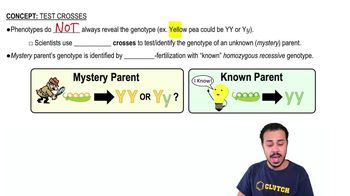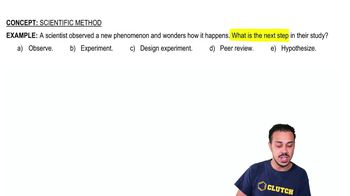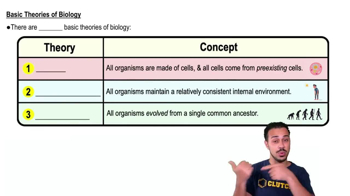Table of contents
- 1. Introduction to Biology2h 42m
- 2. Chemistry3h 40m
- 3. Water1h 26m
- 4. Biomolecules2h 23m
- 5. Cell Components2h 26m
- 6. The Membrane2h 31m
- 7. Energy and Metabolism2h 0m
- 8. Respiration2h 40m
- 9. Photosynthesis2h 49m
- 10. Cell Signaling59m
- 11. Cell Division2h 47m
- 12. Meiosis2h 0m
- 13. Mendelian Genetics4h 44m
- Introduction to Mendel's Experiments7m
- Genotype vs. Phenotype17m
- Punnett Squares13m
- Mendel's Experiments26m
- Mendel's Laws18m
- Monohybrid Crosses19m
- Test Crosses14m
- Dihybrid Crosses20m
- Punnett Square Probability26m
- Incomplete Dominance vs. Codominance20m
- Epistasis7m
- Non-Mendelian Genetics12m
- Pedigrees6m
- Autosomal Inheritance21m
- Sex-Linked Inheritance43m
- X-Inactivation9m
- 14. DNA Synthesis2h 27m
- 15. Gene Expression3h 20m
- 16. Regulation of Expression3h 31m
- Introduction to Regulation of Gene Expression13m
- Prokaryotic Gene Regulation via Operons27m
- The Lac Operon21m
- Glucose's Impact on Lac Operon25m
- The Trp Operon20m
- Review of the Lac Operon & Trp Operon11m
- Introduction to Eukaryotic Gene Regulation9m
- Eukaryotic Chromatin Modifications16m
- Eukaryotic Transcriptional Control22m
- Eukaryotic Post-Transcriptional Regulation28m
- Eukaryotic Post-Translational Regulation13m
- 17. Viruses37m
- 18. Biotechnology2h 58m
- 19. Genomics17m
- 20. Development1h 5m
- 21. Evolution3h 1m
- 22. Evolution of Populations3h 52m
- 23. Speciation1h 37m
- 24. History of Life on Earth2h 6m
- 25. Phylogeny2h 31m
- 26. Prokaryotes4h 59m
- 27. Protists1h 12m
- 28. Plants1h 22m
- 29. Fungi36m
- 30. Overview of Animals34m
- 31. Invertebrates1h 2m
- 32. Vertebrates50m
- 33. Plant Anatomy1h 3m
- 34. Vascular Plant Transport1h 2m
- 35. Soil37m
- 36. Plant Reproduction47m
- 37. Plant Sensation and Response1h 9m
- 38. Animal Form and Function1h 19m
- 39. Digestive System1h 10m
- 40. Circulatory System1h 57m
- 41. Immune System1h 12m
- 42. Osmoregulation and Excretion50m
- 43. Endocrine System1h 4m
- 44. Animal Reproduction1h 2m
- 45. Nervous System1h 55m
- 46. Sensory Systems46m
- 47. Muscle Systems23m
- 48. Ecology3h 11m
- Introduction to Ecology20m
- Biogeography14m
- Earth's Climate Patterns50m
- Introduction to Terrestrial Biomes10m
- Terrestrial Biomes: Near Equator13m
- Terrestrial Biomes: Temperate Regions10m
- Terrestrial Biomes: Northern Regions15m
- Introduction to Aquatic Biomes27m
- Freshwater Aquatic Biomes14m
- Marine Aquatic Biomes13m
- 49. Animal Behavior28m
- 50. Population Ecology3h 41m
- Introduction to Population Ecology28m
- Population Sampling Methods23m
- Life History12m
- Population Demography17m
- Factors Limiting Population Growth14m
- Introduction to Population Growth Models22m
- Linear Population Growth6m
- Exponential Population Growth29m
- Logistic Population Growth32m
- r/K Selection10m
- The Human Population22m
- 51. Community Ecology2h 46m
- Introduction to Community Ecology2m
- Introduction to Community Interactions9m
- Community Interactions: Competition (-/-)38m
- Community Interactions: Exploitation (+/-)23m
- Community Interactions: Mutualism (+/+) & Commensalism (+/0)9m
- Community Structure35m
- Community Dynamics26m
- Geographic Impact on Communities21m
- 52. Ecosystems2h 36m
- 53. Conservation Biology24m
1. Introduction to Biology
Scientific Method
Problem 6`
Textbook Question
If I perform a hypothesis test in which I demonstrate that the prediction I made in question 5 is true, I have ________.
a. Proved the hypothesis
b. Supported the hypothesis
c. Not falsified the hypothesis
d. B and C are correct
e. A, B, and C are correct
 Verified step by step guidance
Verified step by step guidance1
Understand the nature of a hypothesis in scientific research: A hypothesis is a testable statement or prediction that can be supported or refuted through experimentation or observation. It is not 'proven' in the absolute sense, as science is always open to new evidence.
Clarify the meaning of 'supporting' a hypothesis: When experimental results align with the prediction made by the hypothesis, the hypothesis is considered supported. This means the evidence is consistent with the hypothesis but does not prove it definitively.
Clarify the meaning of 'not falsified': In science, a hypothesis is considered 'not falsified' if the experimental results do not contradict it. This is a key principle in the scientific method, as hypotheses must be falsifiable to be scientifically valid.
Evaluate the options provided: Option A ('proved the hypothesis') is incorrect because scientific hypotheses are not proven in an absolute sense. Option B ('supported the hypothesis') and Option C ('not falsified the hypothesis') are correct because the results align with the hypothesis and do not contradict it.
Conclude that the correct answer is Option D ('B and C are correct'), as both supporting the hypothesis and not falsifying it are valid outcomes of the experiment.
 Verified video answer for a similar problem:
Verified video answer for a similar problem:This video solution was recommended by our tutors as helpful for the problem above
Video duration:
44sPlay a video:
Was this helpful?
Key Concepts
Here are the essential concepts you must grasp in order to answer the question correctly.
Hypothesis Testing
Hypothesis testing is a statistical method used to make inferences or draw conclusions about a population based on sample data. It involves formulating a null hypothesis (H0) and an alternative hypothesis (H1), then using data to determine whether to reject H0. The outcome indicates whether there is enough evidence to support H1, but it does not prove the hypothesis definitively.
Recommended video:
Guided course

Test Crosses
Supporting vs. Proving a Hypothesis
Supporting a hypothesis means that the evidence gathered aligns with the predictions made, suggesting that the hypothesis is plausible. However, proving a hypothesis implies absolute certainty, which is not achievable in scientific research. Instead, hypotheses can only be supported or not falsified based on the results of the tests conducted.
Recommended video:
Guided course

Predictions, Hypotheses, & Theories
Falsifiability
Falsifiability is a key principle in scientific inquiry, indicating that a hypothesis must be testable and capable of being proven false. If a hypothesis cannot be disproven through experimentation or observation, it lacks scientific validity. In the context of hypothesis testing, failing to falsify a hypothesis means that the evidence does not contradict it, but does not confirm it as true.
Recommended video:
Guided course

Predictions, Hypotheses, & Theories
Related Videos
Related Practice













